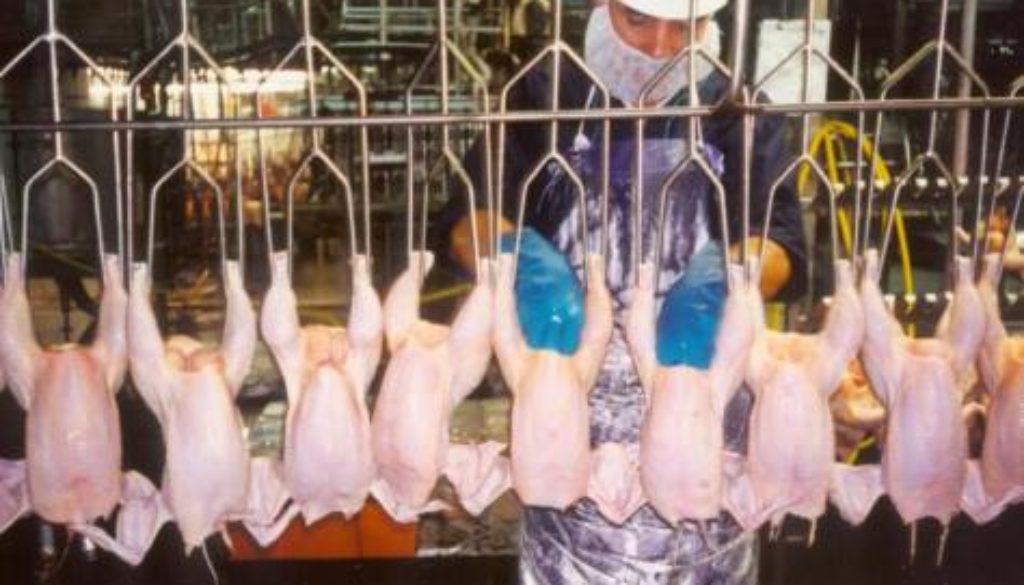USDA Must Protect Communities From Mass Animal Killings
By Valerie Baron, Natural Resources Defense Council
Shutdowns at industrial slaughterhouses due to the COVID-19 crisis have caused backlogs of animals throughout the U.S. that cannot be slaughtered for food because there simply isn’t capacity to process them. As of June 26, 2020 there were COVID-19 outbreaks at more than 250 meatpacking plants, and more than 28,000 meatpacking workers have tested positive. Even the shutdowns have not ameliorated the devastatingly unsafe predicament, and industry has failed to take basic steps to protect workers. Although industry has cruelly tried to keep workers on the job in these life-threatening conditions, there is still a backlog of animals that have either outgrown industrial processing equipment or otherwise cannot be slaughtered for meat. This has led the animal agriculture industry to direct its growers to do the unthinkable: slaughter their animals in the field using gruesome methods that range from suffocation with poison foam to gunshot and dispose of the bodies using dangerous and pollutingmethods like mass burial or burning them on-site without environmental controls.

Sound Rivers https://soundrivers.org/
These, euphemistically termed “depopulations” or “euthanizations” or “cullings,” are being supported, in many cases, by federal funds and coordinated by USDA through its sub-agency the Animal Plant Health Inspection Service, APHIS. In the weeks after the COVID-19 crisis hit, APHIS established the National Incident Coordination Center, the government’s nucleus of activity around animal depopulations. But this “coordination” is not providing the transparency that the public deserves or the safeguards necessary to avoid serious negative consequences for communities that live nearby where these “mass carcass disposals” (another industry-driven euphemism) are taking place.
That is why NRDC, Earthjustice, the Center for Biological Diversity and partners filed an emergency petition with APHIS asking the agency to take immediate action to protect public health and provide basic, vital information about this unprecedented situation.
With our partners, we are asking the agency to ban the most dangerous practices for what the agency calls “mass carcass management”—specifically we need them to protect communities by stopping mass burials (dumping hundreds, sometimes thousands of animal carcasses in a hole in the ground), which can poison drinking water, and also stopping mass incineration of carcasses, which can release horribly dangerous particles and toxic gasses into the air. Both APHIS and industry experts have acknowledged these practices are very dangerous, and psychologically damaging to farmers and neighbors. APHIS: “Human health risks also include the potential for psychological harm arising from coping with the extremely unpleasant odors and sight of animal remains.”
So far neither has moved to stop them. We wrote to APHIS:
APHIS currently allows the industry to engage in the very carcass disposal practices that the Agency “expect[s] to have the greatest impacts to the environment,” and APHIS is providing assistance to the industry without ensuring that surrounding communities have access to the information they need to stay safe.
The actions we request in the petition are necessary because as a result of the agency’s ongoing inaction, communities, especially those already overburdened by pollution and at high risk for severe consequences of the COVID-19 pandemic, and the environment face an unacceptable and avoidable risk.
These depopulations take place where the animals are raised, and like other industries, industrial animal agriculture is a significant source of air and water pollution that endangers nearby people and the environment. Animals at concentrated animal feeding operations (CAFOs) produce tremendous quantities of fecal waste containing harmful pollution. Air pollutants from CAFOs include ammonia, hydrogen sulfide, particulate matter, and bacteria. Exposure to these pollutants can lead to respiratory problems and exacerbate pre-existing conditions, such as asthma. Residents in communities near CAFOs suffer from odor-induced headaches, runny noses, sore throats, excessive coughing, nausea, burning eyes, and other symptoms associated with CAFO air pollution. Farmers and growers themselves often have a high incidence of respiratory related illnesses due to particulate matter, and additional pollution, such as that generated by carcass incineration, are also harmful to their health.
The health threats from this pollution have become extremely acute during the COVID-19 pandemic. Preliminary studies from across the world have consistently found higher mortality rates from COVID-19 in areas with more air pollution. A Harvard University study examining more than 3,000 counties in the US found that even “a small increase in long-term exposure to PM2.5 leads to a large increase in the COVID-19 death rate.”Experts hypothesize that the inflammation caused by pollution-related respiratory conditions causes severe responses to COVID-19. People living near industrial food animal production facilities often already have a baseline elevated risk for health conditions relevant to COVID-19 vulnerability. One study of residents living near industrial hog operations in North Carolina, for example, found the residents to be at risk for several conditions that are known to be risk factors for severe COVID-19. The study found that people living in close proximity to these facilities experience increased rates of death from diseases such as kidney disease, tuberculosis, and septicemia, even after controlling for socioeconomic and other factors such as smoking. Even further, the same study established that African American and Indigenous residents are disproportionately represented in zip codes containing industrial hog operations.
Without swift action, the people who live near industrial animal production facilities will continue to shoulder this pollution burden plus the burden from this unprecedented move to depopulate potentially hundreds of thousands of animals across the country. This is an emergency situation that APHIS can and must address with an emergency rule to protect communities and the environment.

